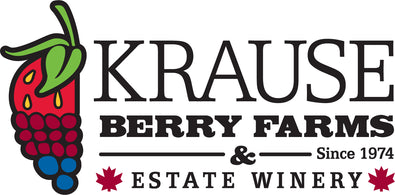Sustainable Farming | Krause Berry Farms
Crop care is vitally important to us.
This helps us respond quickly if there is a potential problem.

We feel that a complete elimination of all agri-chemicals is not a realistic goal in the short term. The use of safer, low residual crop protection agents, with precise timing (when the pests are present) reduces the use of pesticides.
We monitor our fields weekly to stay on top of any potential pest issues.
When needing to address a pest issue, we review the options:
1. Introducing biologicals (ladybugs, predatory mites, etc..)
2. Organic type pesticides
3. Conventional type pesticides.
We want to protect the health and safety of our family, our staff and our guests.

Integrated Pest Management (IPM)
Variety Selection
We try to use varieties that are resistant to as many diseases as possible and are always looking for ones that are more resistant to mold and rot. All of our crops are GMO Free.
Crop Rotation
Crop rotation of annuals and perennials helps to build stronger soil. By rotating crops we aid in breaking the disease, virus and weed build up cycle.
Organic Manures
Chemical fertilizers are used to supplement the needs of different crops. At the base of fertile sils are organic manures, including poultry and horse manure as well as green manures (rye and barley)
Innovative Cultural Practices
We are always seeking new methods of growing our berries and vegetables. For example, we use plastic coverings to plant strawberries. This eliminates the need to spray herbicides directly on the plants and reduces the need for fungicide sprays to control rot.
We collaborate on agricultural research projects with the University of Fraser Valley. We continually research as we attend learning seminars and conventions to keep our knowledge growing as well as our crops.
Pest Monitoring
We regularly monitor both good and bad bug populations in our fields. If the numbers of beneficial bugs are insufficient to keep pests at acceptable measures, a control measure will need to be taken. Possible options include:
1. Introducing biologicals like lady bugs, predatory mites etc...
2. Organic type pesticides
3. Conventional type pesticides
Introducing Predatory Insects
We have introduced ladybugs into our fields to control aphids and have introduced predatory mites to counter two spotted mites, which do severe damage to strawberries. We are also experimenting with predators to control caterpillars in raspberries.
Sprays
Once we have reviewed all of the information and options, we spray if necessary. Sometimes we need to assist mother nature in balancing disease and insect issues. Our goal is to control the problem with the least toxic and most specific chemical available.
Only trained applicators with certified pesticide applicator licenses do the spraying. We follow all Health and Environmental guidelines for spray residues.

